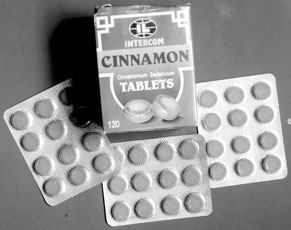Spice exports: Value addition key to achieve targets
by Gamini Warushamana
 |
|
B. Sarada M. De Silva. |
Today most of our spice exports are in bulk form and the value
addition is only around 20 percent. If we start to produce essential oil
and oleoresin using our spices around 300 percent value addition is
possible. For instance Intercom introduced cinnamon tablets using
cinnamon pieces (grade 1 cinnamon) which are exported at US$2/kg and the
tablets are sold at US$200/kg.
The value addition is over hundred times.
Last year, total spice exports was around Rs.17 billion (US$ 170
million) out of which cinnamon alone accounted for Rs.10 billion while
cloves and pepper accounted for Rs.3.3 billion and 2.5 billion. This
year the industry targets a Rs.20 billion export revenue. To achieve a
Rs.100 billion revenue we have to increase our value addition by five
times.
| The spice
and allied products industry can achieve a US$ 1 billion
export revenue target if we start exporting value added
products instead of bulk exports, said the Chairman of
Intercom Limited B. Sarada M. De Silva. Intercom is a
leading cinnamon, spice and desiccated coconut export
company. De Silva is the immediate past president of the
Spice Council of Sri Lanka. Following are excerpts from his
interview with the Sunday Observer. |
To start value addition, the industry needs a lot of incentives from
the government.
Promotion of new value added products in our main markets is also
costly and there should be a well-planned marketing strategy as well.
There should be a long-term policy framework for the sector.
These spices are not the only ingredients used in value added
industries producing essential oils, oleoresin or perfumes. Some
imported ingredients are needed as well.
For an uninterrupted operation of such industries and to maintain our
existing markets we may need to import some spices. The policy framework
should address these demands of the industry to attract investments
locally or from foreign collaborators.
Also we should link this industry with the tourism industry and
introduce spice dishes and aroma therapy in tourism.
Today the industry has faced issues in production and productivity.
Production is limited due to various factors.
The land extent has to be increased,by small holdings as well as
large plantations.
Production can also be increased by increasing productivity. For
instance the average yield of cinnamon is around 450 kg/ hectare but
some estates get 1250kg/hectare.
Therefore it is easy to increase the national average of cinnamon
yield to around 750/hectare.
There is a huge global demand for cinnamon, cloves and pepper. Since
this is considered as a
small-holder industry the productivity aspect has not yet been looked
at.
In the cinnamon market Sri Lanka has the monopoly as we are the only
producer of true cinnamon or Ceylon cinnamon.
 |
|
cinnamon tablets introduced by
Intercom
Pix by: Kavinda Perera |
This position is being challenged and India has started a pilot
project to cultivate cinnamon.
We have not exploited the true potential of this industry. Exporters
under cut prices and market bulk cinnamon at a lower price.
In this game some of our exporters have compromised quality and as a
result poor, inferior quality cinnamon is exported.
Therefore it is high time Sri Lanka took steps to enforce quality
standard for cinnamon exports.
High moisture content is the biggest issue in maintaining the quality
of cinnamon and quality assurance should start at producer level.
We have only 30,000 hectares under cinnamon cultivation and the
industry has faced issues due to the shortage of cinnamon peelers.
Normally cinnamon can be peeled two times a year. But due to the
shortage of peelers most of the growers peel only once a year.
Therefore some sectors of the industry have to be mechanised.
The Spice Council, government and donor agencies have started some
initiatives in this direction. We set up a HACCP and GMP certified model
factory in Kosgoda three years ago.
In addition ten large scale cinnamon processing factories were set up
with GTZ funds.
The Department of Export Agriculture has started a large number of
small cinnamon processing factories.
Quality certification is also important.
USA demand ISO 2000 certification while EU countries demand HACCP
certification. One of the important developments in the industry is that
there are a large number of companies producing to meet these standards.
A cinnamon peeler can earn Rs.15,000-25,000 per month but they are
considered at the lowest level of the social strata, similar to rubber
tappers and tea pluckers.
Therefore the younger generation is not interested in engaging in
this industry.
Our main markets for cinnamon are Mexico, USA, Colombia, Peru,
Germany, UK and France.
Our pepper exports mainly go to India and it is also in bulk form
while value addition is done in India. Sri Lankan pepper is also the
best in the world with the highest piperine content. The Piperine
content in our pepper is double compared to other products. Exporting
pepper light berries is a crime.
Public-private partnership is essential to develop this sector. India
provides the ideal example.
The Spice Board of India was set up in the 1980s and it is run by the
Indian civil service with policy direction from the private sector.
The Spice Board has a fully-fledged laboratory that issues quality
certificates and this facility significantly reduces the cost of
obtaining quality certificates.
Ten years after the setting up of the Board, India became the world’s
largest spice exporter.
The spice Council of Sri Lanka also has a good composition consisting
of government officials, industry experts and business persons.
However, we are slow in achieving our goals as there are bureaucratic
bottlenecks.
|

